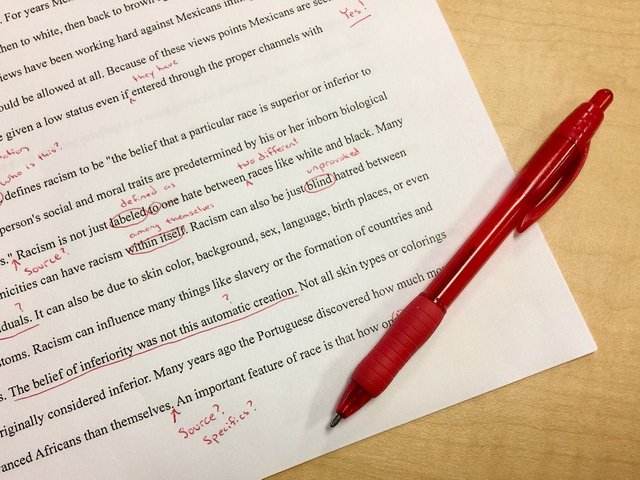
Source
We’ve gotten a lot of new people in the Writers’ Block workshops lately. Some have never been through the critique process before and don’t know what to expect. Critique can feel very personal, and only with time does it start to seem less so. That’s why I hope I can make our new folks feel more comfortable with the work we do, whether they’re receiving feedback or giving it.
Although this article may be mostly slanted towards fiction-workshop, where I'm most active, the basic principles are applicable to all the workshops.
Also note that I say "an editor's perspective." Technically I am an editor. I work as a critter in the workshop on the same basis as everyone else, but I have a professional editing background. So while I say "editor" here because that's how I think of myself, my comments apply equally to "critter"--one who critiques the writing of others in a peer review system.
Honesty Is Mandatory
The only feedback we can give that can actually help an author is honest feedback.
The Truth Can Hurt
Being told that something you wrote needs improvement can sting. And sometimes it hurts more than that, especially if you poured your heart and soul into your writing.
Editors worth their keep don’t dish out critiques because they think it’s fun to break a writer. We don't put comments in because we want to hurt someone's feelings, are angry, or get off on making people feel bad about themselves. Editors like that may exist, but I haven't met any at the Block. As a group we wouldn't tolerate that behavior, so anyone with that attitude wouldn't last.
All of us are also writers ourselves and know how much honest feedback can hurt. So none of us is going to judge you for being hurt or needing some time alone to deal with some feelings before you can talk about your work. And if we're trying to talk about something in public that you would rather not discuss there, just say so. We’re so used to talking about our own work in public forums that we don’t always think about how it can feel to a newcomer. We also consider the Block to be a safe space and many of us feel comfortable discussing things there that we may not want to discuss outside. It's easy to forget that not everyone will have the same comfort level.
While none of us goes out of our way to make you feel bad, it's going to happen. Packing our criticism in cotton wool isn't going to soften the blow. And my experience is that adding padding often makes it worse. Partly because it is easier for the important point needing improvement to be lost in all the padding, and partly because it may end up feeling like the editor either doesn't respect you enough as a writer to just say it or doesn't think you can handle what needs to be said. The purpose of the critique is to improve the writing and help the writer learn to be a better writer. So ignoring or hiding the issue isn't helpful in the long term.
So it's okay to be upset for a while; we've all been there. No one will think less of you for being hurt. Feel free to step away until you've dealt with things. Just don't call your critters nasty things for being honest with you.
Editors Are Human
I know this can be hard to believe, but editors are human beings. This means we make mistakes. We write things that might not make as much sense to you as they do in our heads... or might be easily interpreted entirely differently than we intended. We also miss stuff.
Our feedback is filtered by our knowledge, background, mood, tastes, and expectations. So no, we aren't always right. And no, you don't have to apply everything we say.
However, we are also doing this voluntarily and if we feel like someone ignores a lot of the feedback we give, we might feel less inclined to spend our time editing that person's work in the future.
Questions Are Encouraged
If something isn't clear to you, please ask questions. A comment might be subject to interpretation and need clarification.
The goal isn't to do everything for you, but to help you learn to be a better writer. At the same time, we're learning to be better editors and to be better writers from seeing areas needing improvement in the works of others that we might make ourselves. So don't just blindly do. Ask questions if needed until you understand things. Although sometimes we might be unable to explain something if it is based on a gut instinct. It's also okay for one critter to ask a question of another if something isn't clear or you want to learn more from the comment.
It is important to let someone know through Discord that you have questions. Many of us (like me) ignore the Google mails about comments, so drop the person a note in DM that you left questions in the file.
Disagreements Happen
What is "right" or "best" is rarely black and white. Even if something is grammatically incorrect, there are times in fiction when the incorrect form is more effective or appropriate. It is your job as the author to choose which feedback to apply and which to ignore. Sometimes a few of us will disagree and provide contradicting advice. Confusing, isn't it?
In the end, the story is yours. It is your name that goes on it. So you have to do what feels right to you. But think hard before you ignore feedback, and ask a lot of questions. We often have very good reasons for our recommendations and perhaps you would agree if you understood those reasons better. Often feedback means a sentence or situation needs to be reworked or looked over an extra time, even if you don't resolve it in the way a critter suggested. So look everything over again before just dismissing comments.
If you are putting your piece back in the queue for another round of edits but have chosen not to use some feedback, if would be nice to reply to the comment--even if you mark it resolved--and let the critter know why you didn't use it. Even if your critter is experienced providing feedback, having it dismissed can sting for them, just as it can sting for you to be told something might benefit from changes. This is a habit I need to work on myself.
Requesting a Resubmit Is Not an Insult
Sometimes one or more of us makes several suggestions and recommends that you edit the piece and resubmit. This is not an insult. This does not mean that you should never write again. It does not mean your story is a total disaster. It usually means that there is a lot of potential in your piece and we want to help you bring that out.
In the real world, both fiction and nonfiction usually go through several rounds of editing. Stuff gets missed. Changes introduce new issues and conflicts. Sometimes you need to rewrite a piece extensively and try again. Other times there is a recurring issue that, once you are aware of it, you can go back and make changes to the rest of your piece yourself. Also sometimes there are so many suggestions and highlights that we can't see the story anymore to edit intelligently.
This is where resubmitting helps. You first need to work through the existing feedback, choosing what to use and what to lose and trying to apply suggestions throughout as best you can, then let us see it again. You might need to spend some time letting ideas simmer, so don't worry if it's a week or two or more before you are ready to come back.
Don't let a request or suggestion for a resubmit discourage you. The fact that we are willing to look at it again is actually encouragement.
And if it makes you feel better, I've had pieces myself go through three or four rounds of edits. Usually a few rounds of developmental stuff followed by some final polishing up. So needing more edits doesn't mean you aren't any good. It might mean you are so good that we don't want to miss even the tiniest of errors.
Receiving Copious Comments Isn't Bad
Those emails from Google that someone left X number of comments in your file. They can be worrying. I've had comments number in the 30s myself and not on a long piece. But someone leaving a lot of comments means they cared enough to take the time to make them. Remember that you're not paying us to do this. So if we spend a few hours and make a zillion comments, we've invested a lot of time and energy in you. If we didn't think you could do something good with our feedback, why would we bother?
But what if there are only a few comments? That isn't bad either. That might mean your piece was close to print ready. It also might mean that someone didn't have time for more or that your piece wasn't a style or genre they felt comfortable critting in depth.
Personally I go with ignoring all those Google mails. I just check once in a while to see how much feedback I have and when I feel like I have enough stuff that points me in the right direction--especially noting how much is at the end of the file--I take it out of the queue and go to work. After revising, I decide if I want to put it in again or publish it. If several days pass and there isn't much feedback, again I make a decision on what to do with it depending on how I feel myself about the piece.
Editors Have Lives
We can't always do an entire piece in one sitting. Things happen and we get called away from the computer, have projects of our own to deal with, or just need a break for a while. So just because one of us has made a few comments doesn't mean we're done giving feedback, particularly if they don't continue all the way through the piece. Especially if those comments feel negative, please give us time or drop us a DM to ask if we were finished with your submission.
Occasionally it happens that I get part way through something and it is a day or two before I can get back to it. It's part of my having a life and personal stuff and this all being done as a volunteer. Sometimes it's gone from the queue or published before I can come back to it.
I also work offline often, so I might have comments that come into your story with no knowledge of what comments others have made while I was offline. You might even have taken it out of the queue, edited, then have stuff come through. I know at least one other of our "senior" editors also works on stories outside of google docs then puts her comments in afterwards. So she might be working on you with nothing apparent and come back to find you've taken it down. So do try to give us time if you can!
Join Us
I hope this article will help you feel more comfortable about workshopping your piece in the Writers' Block workshops and about any feedback you may have gotten. Remember that the story or article is yours, so you have to make your own choices about what feedback to use and what feedback to lose. But remember to think hard on it and consider asking questions if something is unclear.
Hopefully some of you may already have, or will soon have, the courage to join in on the critting side of things also. If you're thinking about it but aren't sure if you can provide feedback others will find useful, take a look at the companion piece, Critiquing Basics for Writers and Readers. If you can read and think about what you read, you are capable of providing useful critiques for other writers.
About the Author
This article was written by @bex-dk, one of the moderators on The Writers' Block Discord server. Her BA in English and her tech editing experience come in handy when she offers critiques in the Writers' Block workshops. This, along with her own writing, has forced her out of her hermitage and ruined her book-a-day reading average.
If you're a writer--fiction, nonfiction, poetry, plays or screenwriting, songs--click our logo and come check out the awesome writers' communities on the Writers' Block.

Thank you for publishing this. I really hope it can help some of our members.
Downvoting a post can decrease pending rewards and make it less visible. Common reasons:
Submit
Thank you for this fantastic, thorough, instructive, and encouraging perspective.
As a writer who has benefitted greatly by submitting my writing to the scrutiny of the fine folk at The Writers' Block, I don't hesitate to say that it is "The Write Thing to Do." ;) My stories and I have been treated in a very kind and caring fashion, yet honestly.
I recall one story I submitted, feeling lukewarm about, that got the honest feedback I desperately needed. The result was a rewrite and a definitely improved outcome.
Writers and prospective writers, I can't recommend the experience enough.
😄😇😄

Downvoting a post can decrease pending rewards and make it less visible. Common reasons:
Submit
Hi @thewritersblock! You have received 0.1 tip SBD + @tipU upvote from @dswigle :)
from @dswigle :)
@tipU - send tips by writing tip! in the comment, get share of the service profit :)
Downvoting a post can decrease pending rewards and make it less visible. Common reasons:
Submit
I joined the writer's block a while ago have not really been there, however, after reading this article, I am wondering what I am waiting for. I cannot even begin to tell you how much differently I feel about it now. See you there soon! Thank you. Tip!
Downvoting a post can decrease pending rewards and make it less visible. Common reasons:
Submit
@thewritersblock,
Thanks for the article @bex-dk, I have a better understanding of the process now that I have read your article.
@Lymmerik
Downvoting a post can decrease pending rewards and make it less visible. Common reasons:
Submit
I was drawn to this as I am about to receive my first manuscript assessment for my first novel so this was a good reminder on how to deal with feedback. I am not aware of Writers Block so will check it out. Thanks.
Downvoting a post can decrease pending rewards and make it less visible. Common reasons:
Submit
Nice post love what you do!
Downvoting a post can decrease pending rewards and make it less visible. Common reasons:
Submit
@originalworks
Downvoting a post can decrease pending rewards and make it less visible. Common reasons:
Submit
@originalworks
Downvoting a post can decrease pending rewards and make it less visible. Common reasons:
Submit
The @OriginalWorks bot has determined this post by @thewritersblock to be original material and upvoted(1.5%) it!
To call @OriginalWorks, simply reply to any post with @originalworks or !originalworks in your message!
Downvoting a post can decrease pending rewards and make it less visible. Common reasons:
Submit